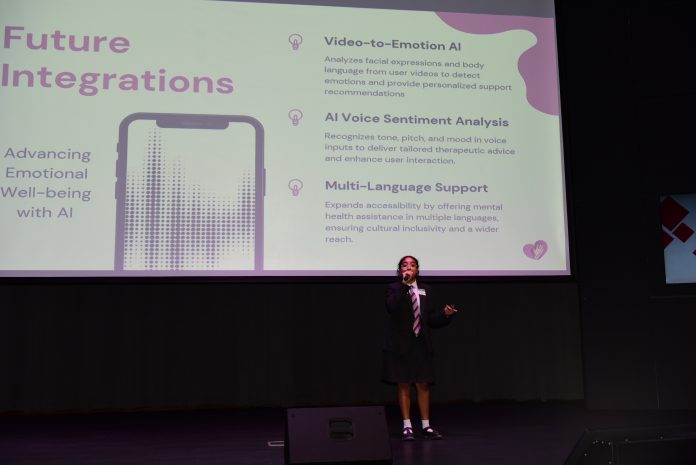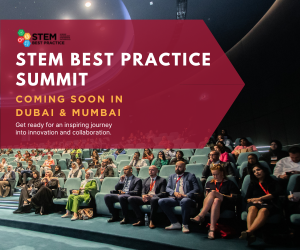 Meet Tamanna Ajith, a 16-year-old Grade 12 student at The Millennium School, Dubai, who believes that STEM isn’t just about systems and structures—it’s about solving problems that truly matter for people who need it most. A TEDx speaker and winner of national STEM and public speaking competitions, you’ll find her leading clubs, councils, and conferences, from debates and MUNs to innovation and wellbeing workshops. With internships at NUS and AWS and certifications that fueled her passion for tech with purpose, Tamanna continues to break barriers. Whether it’s organizing girls’ e-sports events or building impactful solutions at hackathons, she is driven by one vision: making a real-world impact.
Meet Tamanna Ajith, a 16-year-old Grade 12 student at The Millennium School, Dubai, who believes that STEM isn’t just about systems and structures—it’s about solving problems that truly matter for people who need it most. A TEDx speaker and winner of national STEM and public speaking competitions, you’ll find her leading clubs, councils, and conferences, from debates and MUNs to innovation and wellbeing workshops. With internships at NUS and AWS and certifications that fueled her passion for tech with purpose, Tamanna continues to break barriers. Whether it’s organizing girls’ e-sports events or building impactful solutions at hackathons, she is driven by one vision: making a real-world impact.
1. Congratulations on winning the Best Innovative Idea Award! Could you introduce us to your innovation, what issue does it address, and how does your solution work?
Thank you so much, this recognition truly means a lot to me! Revora is a gentle and
thoughtful emotional wellness companion. It was created to support people who are
going through their own emotional experiences, especially those dealing with terminal
illness or deep loneliness. The idea is to give them a safe space to feel heard and
supported. Revora includes tools like private journaling, a therapy assistant that listens
and responds with empathy, a mood tracker to help people notice emotional patterns, a
community space to connect with others, and a memory book to preserve special
messages for loved ones. It is designed to feel like a caring friend who is always there,
for you.
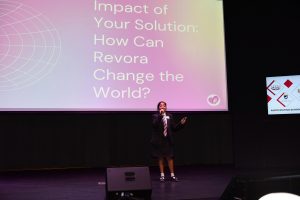
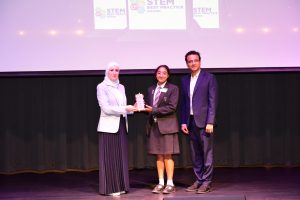
2. What inspired this idea? Was there a specific challenge, personal experience, or
community need that motivated you to take action?
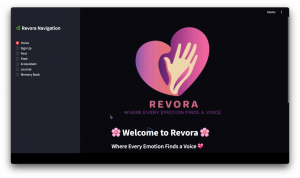
The idea was inspired by the story of Beverly Sand, who’s story I read on the
newspaper, back in 2022. She was a terminal cancer patient who sadly passed away
alone after struggling with deep emotional pain. When I read about her, it truly stayed
with me. Her experience made me realize how many people in the world are silently
suffering without any real emotional support. That story made me want to do
something. Something that would help even one person feel a little less alone. That was
the beginning of Revora.
3. How has your idea made an impact so far – whether within your school or
community?
Right now, I’m working together with two other students, Avani Tiwari and Tanush Vivek Chainani, and our school’s leadership team, to bring Revora into our school and make sure it fits the emotional needs of students. Even though we are still developing it, the response has been so encouraging. Friends have shared how much something like this is needed. Teachers have supported the idea and offered helpful feedback. What makes me happiest is that people are starting to open up about their emotions, as conversations are happening and awareness is growing. And that alone already feels like impact, to me!
4. Every innovation journey comes with obstacles. What were some of the key
challenges you faced while developing or presenting your idea, and how did you
tackle them?
One of the hardest parts was finding a way to make the technology feel human. It
is not easy to create something that truly listens and responds with care. Another
challenge was finding the courage to speak about something so emotional in front of
others, especially when innovation is often seen as something purely technical. But
every time I felt unsure, I thought about why Revora was needed. We asked for guidance
from teachers, listened to honest feedback, and made many small changes that led to
big improvements. The process taught me how to keep going even when things felt
uncertain.
5. Looking ahead, what are your plans for this innovation? Do you see opportunities to scale, improve, or implement it in real-world settings?
Yes, absolutely! The immediate plan is to bring Revora into the school environment
so that students can begin using it and benefiting from its features. Beyond that, the
vision is to see it expand into many other spaces where emotional support is needed,
such as hospitals and care centers. There are also exciting possibilities for new
features, like detecting emotions through voice and facial expressions, and offering
support in multiple languages to make it more inclusive. The goal has always been to
create something that feels truly accessible, comforting, and human. Revora has the
potential to grow into a companion that helps anyone, anywhere, feel safe, understood,
and never alone.



